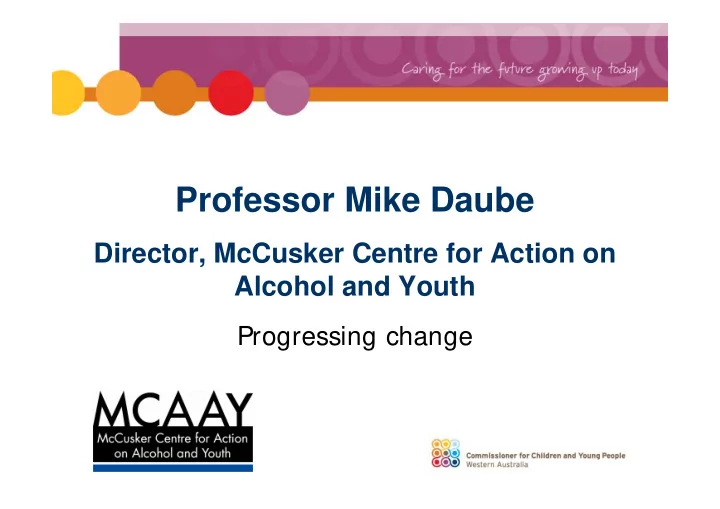

Professor Mike Daube Director, McCusker Centre for Action on Alcohol and Youth Progressing change
Where Next? Slide acknowledgements: Steve Allsop, Neil Guard, Sandra Jones, Julia Stafford
Reducing alcohol ‐ related harm in children and young people forum 23 September 2011
Are we drinking more? Per capita alcohol consumption in Australia Source: Tanya Chikritzhs, Steve Allsop, Rob Moodie & Wayne Hall December 2010 Slide 4
‘One of the main reasons I drink is to get drunk’ Report 43.3% of 16 ‐ 17 year old WA school students. Source: ASSAD Survey 2008.
Impacts of Alcohol Forum Series May 2011: Brain Development and FASD July 2011: How Alcohol Affects My Work November 2011: Violence and alcohol
WE KNOW WHAT NEEDS TO BE DONE • Individuals • Community • Governments
Education and Health Standing Committee Recommendations • Allow ‘controlled purchasing operations’. • Increase enforcement and amend the objects of the Act. • Introduce secondary supply legislation. • Mandatory drug and alcohol education in all schools • Assess the benefits of having a split age limit. • Introduce a minimum floor price on alcohol. • Introduce a tiered volumetric tax.
What can we do? (EXPERT CONCLUSIONS) • We will need a range of responses – I ‐ E ‐ D • Prevent use and prevent exposure to risk • Delay onset of use • Reduce harm in those who use – for them and for others – Control supply – supply matters – Control promotions – Reduce demand – Connectedness matters – adults, community, school – Address needs of vulnerable individuals, families and communities • And …. What we do as adults matters (From S. Allsop)
National Preventative Health Taskforce Key Action Areas 1. Improve the safety of people who drink and those around them 2. Increase public awareness and reshape attitudes to promote a safer drinking culture in Australia 3. Regulate alcohol promotions 4. Reform alcohol taxation and pricing arrangements to discourage harmful drinking 5. Improve the health of Indigenous Australians 6. Strengthen, skill and support primary healthcare to help people in making healthy choices 1. Build healthy children and families 2. Strengthen the evidence base
Education and Health Standing Committee Recommendations • Allow ‘controlled purchasing operations’. • Increase enforcement and amend the objects of the Act. • Introduce secondary supply legislation. • Mandatory drug and alcohol education in all schools • Assess the benefits of having a split age limit. • Introduce a minimum floor price on alcohol. • Introduce a tiered volumetric tax.
OBSTACLES • Cultural • Other priorities • Opposition to action – major interests • Politicians express concern – race for soft options • All too hard
WA 2008 Australian School Students Alcohol and Drug (ASSAD) Survey Smoking Prevalence: 12 ‐ 17 year olds in Western Australia: 1984 ‐ 2008
The Australian cigarette pack in 2012
WA Alcohol and Youth Action Coalition
Mission To reduce alcohol related harms in young people through reduced overall consumption and lower risk patterns of consumption. Primary target group: Western Australians aged 14 to 25 years.
Approach • Comprehensive action at various levels. • Work in WA and nationally where appropriate. • Stimulate and inform community discussion. • Influence young people directly and indirectly. • Raise awareness of the: – Magnitude of harms – Approaches we know can work – Other options – Need to act without delay.
Targets for Action Community education Public awareness Working with Indigenous Availability and organisations and access communities Price Exposure to advertising, Drink ‐ driving marketing and sponsorship Developing Support for services coalitions Support for research
Scope for hope • Awareness • Concern in community • Concern among young people • Organisations – government, non ‐ government, community • Public opinion • We know what to do
What we can all do • Show our concern • Exemplar role – parents and others • Act as individuals • Act as organisations • Engage the community • Work in coalitions • Seek action from governments at all levels • Stay with it
“Change comes from small initiatives which work, initiatives which, initiated, become the fashion. We cannot wait for great visions from great people, for they are in short supply at the end of history. It is up to us to light our own small fires in the darkness.” Charles Handy
Recommend
More recommend